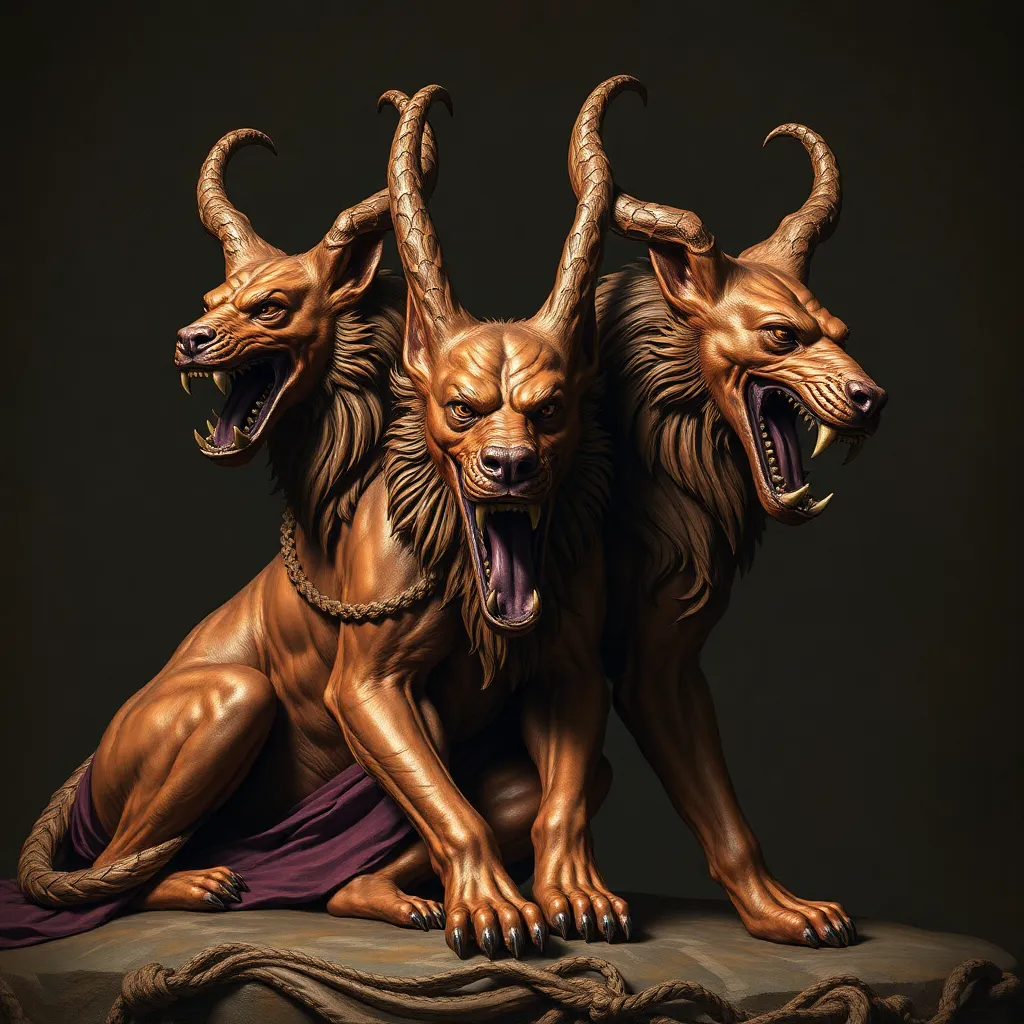Cerberus in Roman Literature: Uncovering the Myth’s Influence on Virgil and Ovid
I. Introduction
Cerberus, the legendary three-headed dog of Greek mythology, stands as a powerful symbol of the Underworld and the afterlife. This mythological creature, known for guarding the gates of Hades, has captivated the imagination of countless generations. In Roman literature, Cerberus takes on a significant role, particularly in the works of prominent poets like Virgil and Ovid.
The importance of Cerberus in Roman literature lies not only in its representation of death and the afterlife but also in how it reflects the cultural values and fears of Roman society. This article aims to explore the representations of Cerberus in Virgil’s “Aeneid” and Ovid’s “Metamorphoses,” revealing the nuanced interpretations each author provides.
II. The Origins of Cerberus in Greek Mythology
Cerberus is primarily known as the three-headed guardian of the Underworld, often depicted with a serpent’s tail and a mane of snakes. This monstrous creature serves to prevent the dead from escaping and the living from entering the realm of the dead without permission.
In Greek myths, Cerberus is often associated with various heroes and their journeys into the Underworld. Notable tales include:
- Heracles’ capture of Cerberus as one of his Twelve Labors.
- The journey of Orpheus, who sought to retrieve his wife Eurydice from the Underworld.
- The adventures of Odysseus, who encounters spirits in the realm of the dead.
As the myth of Cerberus transitioned into Roman culture, it retained much of its original significance, adapting to the new context while continuing to symbolize the fears surrounding death and the afterlife.
III. Cerberus in Virgil’s “Aeneid”
Virgil’s “Aeneid,” an epic poem that tells the story of Aeneas’s journey to found Rome, contains a rich tapestry of themes such as fate, duty, and the afterlife. In Book VI, Aeneas descends into the Underworld, where he encounters Cerberus.
In this work, Virgil presents Cerberus as a fearsome yet ultimately manageable guardian. Aeneas, guided by the Sibyl, uses honeyed cake to tame Cerberus, allowing him passage. This depiction serves several purposes:
- Symbolic Significance: Cerberus represents the inevitability of death and the trials one must face to reach the afterlife.
- Theme of Control: Aeneas’s ability to pacify Cerberus suggests that even the most fearsome guardians of fate can be overcome with cunning and preparation.
Virgil’s portrayal of Cerberus emphasizes the themes of destiny and the importance of heroic virtue, framing the Underworld as a place that, while terrifying, can be navigated by those who are worthy.
IV. Cerberus in Ovid’s “Metamorphoses”
Ovid’s “Metamorphoses,” a narrative poem that weaves together various myths of transformation, presents Cerberus in a markedly different light. In Ovid’s retelling, Cerberus is characterized not just as a monstrous guardian but as a creature capable of evoking sympathy.
Ovid explores the duality of Cerberus’s nature, illustrating themes of transformation and the complexity of existence. Some key points include:
- Role in Myth: Cerberus appears in the context of other myths, such as the tale of Psyche and her trials, showcasing his multifaceted character.
- Thematic Depth: Ovid’s Cerberus reflects the idea of change and the fluidity of identity, resonating with the overarching theme of transformation in “Metamorphoses.”
In Ovid’s work, Cerberus is not merely a guardian but also a figure that embodies the struggles of transformation and the coexistence of fear and empathy.
V. Comparative Analysis of Cerberus in Virgil vs. Ovid
The portrayals of Cerberus in Virgil and Ovid reveal distinct differences in characterization and thematic emphasis.
- Differences in Portrayal:
- Virgil presents Cerberus as a formidable obstacle that must be overcome, emphasizing heroism and control.
- Ovid portrays Cerberus with a sense of complexity, evoking sympathy and understanding of the creature’s plight.
- Thematic Contrasts:
- Virgil focuses on fate and duty, with Cerberus symbolizing the inevitable challenges one faces.
- Ovid highlights transformation and duality, reflecting the multifaceted nature of existence.
Each author’s unique style shapes their interpretation of the myth, offering contrasting insights into the nature of Cerberus and its significance.
VI. The Symbolism of Cerberus in Roman Literature
Cerberus serves as a powerful symbol throughout Roman literature, embodying various themes that resonate with Roman society.
- Representation of Death: Cerberus embodies the fear of death and the unknown, a prevalent theme in Roman thought.
- Guardian Figure: As a guardian of the Underworld, Cerberus reflects societal views on mortality and the afterlife.
- Metaphor for Struggles: Cerberus can also symbolize the internal struggles faced by individuals, representing the fears and challenges of life.
This rich symbolism enhances the understanding of human experiences and fears in the context of Roman literature.
VII. Legacy of Cerberus in Later Literature and Art
The influence of Virgil and Ovid on subsequent literary works is evident in the continued representation of Cerberus in various cultural contexts.
- Renaissance Interpretations: Cerberus was often revisited by Renaissance artists and writers, who drew on the classical tradition to explore themes of death and the afterlife.
- Modern Representations: In contemporary culture, Cerberus remains a potent symbol, appearing in literature, film, and art, often as a representation of the darker aspects of human nature.
The enduring nature of Cerberus in literature and art illustrates the timeless relevance of the myth in exploring profound human experiences.
VIII. Conclusion
Cerberus’s significance in Roman literature extends beyond its role as a guardian of the Underworld. Through the works of Virgil and Ovid, Cerberus emerges as a complex symbol that encapsulates themes of fate, transformation, and the human condition.
The cultural and literary legacy of the myth continues to resonate, offering insights into Roman perspectives on life, death, and the struggles inherent in the human experience. As we reflect on Cerberus, we gain a deeper understanding of how ancient myths inform our contemporary views on mortality and the afterlife.



